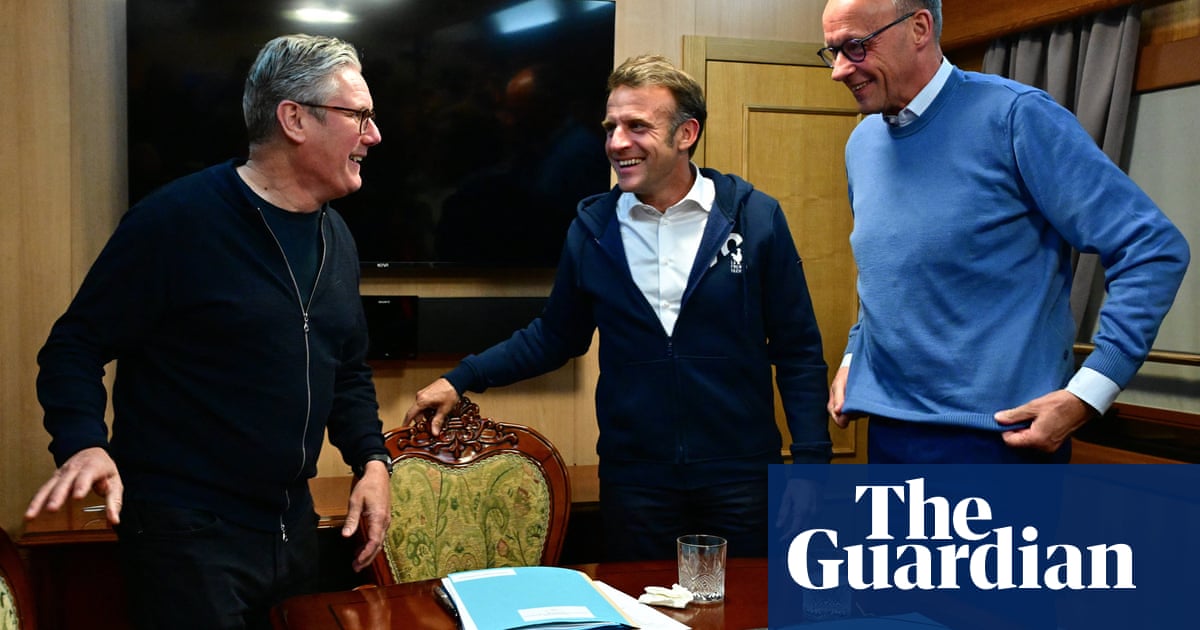The Élysée Palace has derided as “disinformation” claims being promoted by Kremlin figures that Emmanuel Macron took cocaine with Friedrich Merz, the German chancellor, and Keir Starmerwhile on a train travelling to Kyiv.
The false claims, which emerged on pro-Russian social media channels before being taken up by a Kremlin spokesperson and another official, come amid a recent surge in Kremlin efforts to marginalise European efforts to supportUkraine.
“This fake news is being spread by France’s enemies, both abroad and at home. We must remain vigilant against manipulation,” the Élysée posted on X after images were shared online of Macron palming a handkerchief or tissue from a table where he was sitting with the British prime minister and Merz.
While the handkerchief was clearly identifiable in high-resolution images of the meeting as the object picked up by Macron, conspiracy theorists online suggested the French president was concealing a bag containing cocaine and that Merz was holding a white cocaine spoon.
“This is a tissue. For blowing your nose,” the Élysée posted next to an image from the meeting. “This is European unity. To build peace.
“When European unity becomes inconvenient, disinformation goes so far as to make a simple tissue look like drugs.”
The cocaine claim had been rapidly amplified by senior Russian figures, including the Kremlin’s foreign ministry spokesperson, Maria Zakharova, on her Telegram channel.
“After pushing Zelensky into yet another hellish scheme to derail a settlement and prolong the bloodshed in Europe, it’s like a joke: a Frenchman, an Englishman, and a German got on a train – and did a line,” Zakharova wrote on Sunday.
“Apparently, they were so out of it they forgot to hide the paraphernalia – a small bag and a spoon – before the journalists arrived. Europe’s fate is in the hands of placeholders who are dependent, in every sense of the word.”
Kirill Dmitriev, an envoy of Vladimir Putin and head of the Russian Direct Investment Fund (RDIF), also commented on the video. “Is this footage AI or real? If it’s real – are we looking at sugar or something entirely different? If it’s something else, it explains a lot of recent ideas and proposals,” he said on X.
The disinformation around the drug taking, which is not the first time Russian officials have made similar untrue claims, comes amid wider efforts by the Kremlin to sow discord between the US, Europe and Ukraine over pressure for a ceasefire.
“Putin is attempting to manipulate ongoing discussions about a ceasefire and future peace in Ukraine, likely in an effort to undermine Ukrainian-US-European unity around a comprehensive 30-day ceasefire in Ukraine,” the non-profit Institute for the Study of War said this week.
“Kremlin officials have recently intensified their engagement with western media in an effort to message directly to the Trump administration and American public and portray Russia’s terms for Ukraine’s surrender as reasonable.”
In tandem with that, Russia has stepped up more covert efforts to tarnish western leaders, not least Macron, via “pro-Russian” accounts on social media aimed at undermining political trust.
In the past Russian officials including Zakharova have suggested that the Ukrainian president, Volodymyr Zelenskyy, was an “unstable cocaine addict” and Zakharova has also claimed that drug use was common among European leaders.
